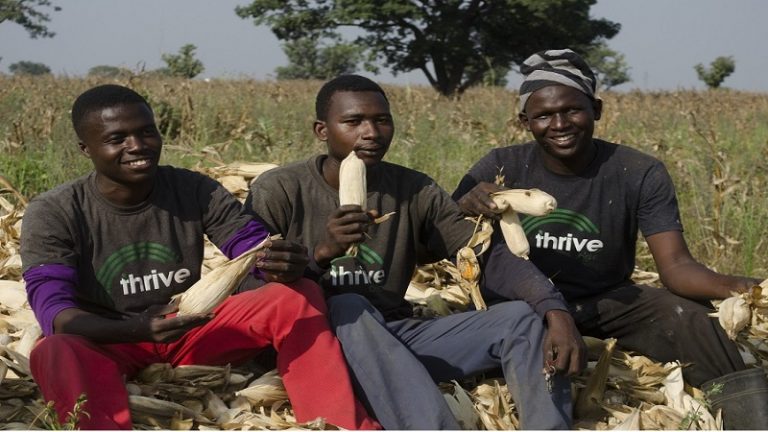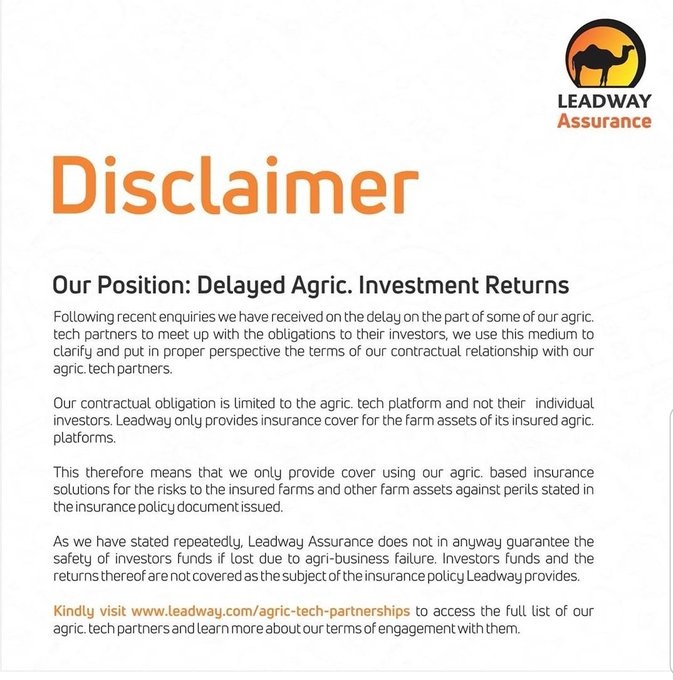
Thrive Agric defaulted on its crowd-sourced investment commitments, creating the typical scenario which the Securities & Exchange Commission (SEC) Nigeria has been warning people for years. People had invested with promises of fixed percentage returns. But when Covid-19 came, Thrive Agric went into extended coma as farming systems froze. Unfortunately for the startup, the investors were promised an amount, and they rightly expected to be paid.
To cause more pain for the investors, Thrive Agric insurer, Leadway Assurance, just put out a statement, informing the world that it only insured the farms, not the individual deposit’s money. That complicates the whole system.
Expect the SEC to draw the hammer here and fines could fly. Unless Thrive Agric could raise money, and pay these investors, it could be in real troubles as the loop has been broken. Yes, not many people would be open to invest new resources, bringing the business model into paralysis.
Register for Tekedia Mini-MBA edition 18 (Sep 15 – Dec 6, 2025) today for early bird discounts. Do annual for access to Blucera.com.
Tekedia AI in Business Masterclass opens registrations.
Join Tekedia Capital Syndicate and co-invest in great global startups.
Register for Tekedia AI Lab: From Technical Design to Deployment.
That said, as individual investors, we need to understand the risks in these investments. Agriculture is a tough business and when someone is promising high returns, you need to understand the risks. The fact is this, running business operations in Nigeria at the moment is expensive. So, margins may not just be there for high payouts, no matter the promises on paper. Of course, that is not to say that people should not be paid as put on contracts.
Largely, this is a case study why government is not stupid when they put these regulations which many of us hate. Government wants to protect your N1 million and you are angry you cannot be allowed to get your “guaranteed N200k” yearly returns on your own money. Now, a bad thing has happened, and everyone is asking the government for help.

---
Register for Tekedia Mini-MBA (Sep 15 – Dec 6, 2025), and join Prof Ndubuisi Ekekwe and our global faculty; click here.



Those that buy shares in companies that end up remaining perpetual underperformers, do they get paid? If not, why painting start-ups as though a fraud was perpetrated? Investment remains investment, and not bank deposits, so even when you are promised ‘guaranteed return’ and the company couldn’t deliver, based on external factors, I don’t see why it should attract any form of hysteria.
Bringing SEC to over regulate some of these small investment vehicles is never a good idea, it kills entrepreneurship, it kills innovation!
This idea of wanting to be too conservative or overprotecting everything is why we are not breaking many barriers, because we somewhat believe it’s possible to earn big returns without considerable risks; it doesn’t work like that.
The only thing that requires probing is to find out if the management diverted funds for personal use, or grossly mismanaged as a result of sheer incompetence; but if it’s just a case of natural cause or horrible economic conditions, there’s no one to be blamed here. If Thrive Agric is still in business, the investors can give them a breathing space to attempt a comeback, it doesn’t call for tearing down everything.
We need to cultivate the right mindset for emerging economy.
I think you miss the point Francis by comparing apples and oranges. I am an investor in both markets and also a stockbroker. I can tell you that no shares or equity investment specifically promises a guaranteed return. The moment you guarantee a return, you have moved into the sphere of fixed income or debt instruments, and in that market, your word is your bond.
The problem with the entrepreneurs cum start-ups is that they want the best of both worlds. Promising guaranteed returns gives them the opportunity to raise funds quickly, whereas, if they mentioned the risks involved, investors would walk away or ask more questions, so they take the easier route and don’t put risk management at the centre of what they do.
They co-mingle funds and are not upfront about what they are doing. For example, one of them took investors’ funds meant for a pig business and also went into real estate selling small units of investment. I predicted to his staff at the time that the model will fail, today it has failed.
Like Prof. alluded to, government is not entirely stupid when they try to put these cautions and sound the warnings because when the bubble bursts, it is government we will call and there are numerous examples to draw from, ranging from people embarking on desert crossing to MMM.
There is a reason that there are professionals in various fields to help guide actions of a system to achieve its corporate goals. The moment business owners understand this, the less mishaps they will fall into.
As a rider, do any of these crowdfunding platforms have an investor protection fund? Your guess is as good as mine.
You speak my mind perfectly.
@Fracis Oguaju. I agree with your points on over-regulation. I believe Startups need to put budget a certain percentage of their capital as “Emergency Funds”. Emergency funds are used to settle investors and employees in case a business has problems. SEC made provisions for this in their guidelines, but the problem is that the amount set by SEC for running a crowd funding platform is too high (100 Million Naira), I believe it should be reduced to about 30 – 50 Million.
Before you set up a crowdfunding platform, you should have a reserve capital base of about 30 Million instaed of 100 Million.
Also Registered tax paying Crowdfunding platforms should be eligible for bail out from the Federal Government through the CBN in the event of a major catastrophy like COVID-19.
What do you guys think about this?
I like your line of thinking Francis. Investments are associated with corresponding risk and in most cases the higher the risk, the higher the returns.
I am yet to read about fraud being the reason for the current predicament, rather, it seems to me that they would have been in a bitter situation had their lawyers looked properly into their insurance to ensure it covered their exposure in situations as this.
I am yet to see a copy of the T&C on their investment note, but I would have thought that it also contains a clause on natural disasters or act of God as a limitation for performance on the guaranteed return. If there is such, then one can not cry foul.
The aspect of SEC however, can not be seen as overregulation because of the exposure in situations as this. Funds of this magnitudes are best are required to register with SEC in order to protect investment, although it will hardly protect the guaranteed returns.